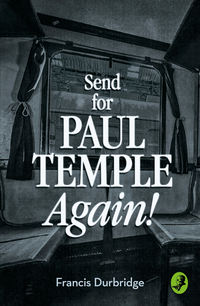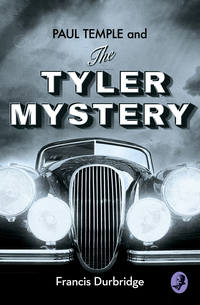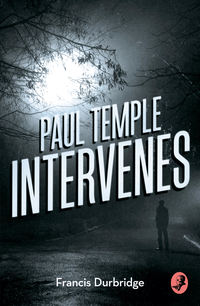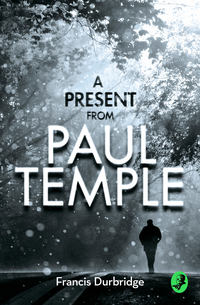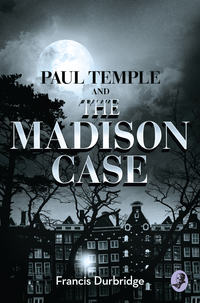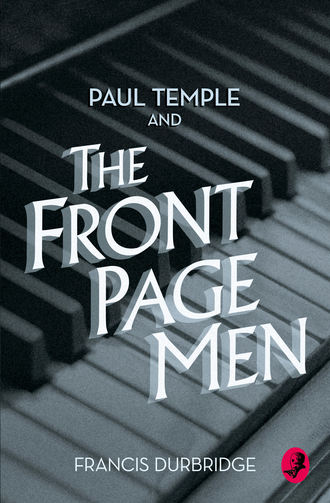
Полная версия
Paul Temple and the Front Page Men
Forbes’ anger was obviously rising. ‘It seems to me that you took a very grave risk.’
That,’ murmured Andrew Brightman politely, ‘like so many things, Sir Graham, is a matter of opinion.’
Once again the Chief Commissioner was at a loss, finally he asked, ‘Is your daughter in town at the moment?’
‘She’s at school in France. A small place near St. Raphael. She’s been there six months. I thought was advisable to send her away after that business.’
Sir Graham gave a nod of understanding. ‘Now, Mr. Brightman, when you handed over this money, did you retain the numbers of the notes?’
Brightman shook his head. ‘I was told to deliver it in twenties – I remember that rather surprised me. However, I cashed a cheque at Floyds, in Manchester Street, my private bankers. I daresay they could tell you the numbers. I understand it’s usual to keep a record.’
Sir Graham waved aside the suggestion. ‘How did you receive your instructions about delivering the money?’ he asked.
‘By telephone. It was the Monday after Margaret had disappeared. I didn’t feel like going to the office in case something should turn up, and I was wandering round the library when the phone rang.’
Sir Graham seemed incredulous. ‘Do you mean to tell me you waited two days without making any move?’
Mr. Andrew Brightman was still very sure of himself, however. ‘I had a reason for waiting,’ he answered quietly.
‘Then I should very much like to hear that reason.’
‘When Margaret vanished,’ continued Brightman, ‘naturally my first thought was to get in touch with the police. I was actually on the point of doing so when my butler brought me a small card. There was nothing unusual about it, except that it had no address and had obviously been delivered by hand. Morgan, my butler, thinks it must have been left in the letterbox while we were all rushing over the house looking for Margaret. This must be true, because he had already cleared the first delivery of letters out of the box and put them on my desk.’
‘H’m, very interesting. Now tell me, who was the first person to discover your daughter was missing?’
‘The maid. She used to take Margaret a glass of milk at about eight o’clock every morning. On this particular day she was surprised to find Margaret was not in her room, and that apparently the bed had not been slept in. Naturally, the poor girl was quite bewildered, so she called Morgan.’
‘And you were about to phone the police when Morgan brought you this card?’
Brightman nodded. ‘Yes. We’d searched the house from cellar to attic, and I was getting more and more alarmed. By the way, I thought perhaps you’d be interested to see the card.’
He handed over a slip of pasteboard, which Sir Graham examined carefully through a small but powerful magnifying glass. It bore the simple message:
Don’t call the police. Wait 48 hours. The child is safe.
The Front Page Men.
‘Thank you,’ said Sir Graham at length. ‘I should like to keep this for the time being, if I may.’
‘Of course, sir,’ agreed Brightman, who now appeared to be more at ease than ever, and spoke in the slightly pompous manner of the chairman of a company who is about to disclose the payment of an extraordinary dividend. ‘You can imagine,’ he went on, ‘what a state I was in when I received that note. I didn’t know what to do. Suddenly I made up my mind to wait.’ Brightman paused. ‘I needn’t tell you what that week-end was like, Sir Graham. Every minute seemed an eternity. I wouldn’t go through it again – not for a million!’
Suddenly the recollection of this experience seemed to upset his urbanity for the first time. He swallowed hard, shifted uncomfortably in his chair, and ran a finger round the edge of his collar before continuing. ‘Both Morgan and the maid wanted me to send for the police. In fact, Morgan threatened to go over my head and get in touch with Scotland Yard himself. The poor devil is devoted to Margaret, and he was completely unnerved. Then, at about half past nine, another note was delivered.’
He handed over the second card, which read:
Be near the telephone tomorrow morning. The child is safe.
The Front Page Men.
Forbes examined it carefully, but it appeared to offer no clue.
‘How long have Morgan and the maid been in your employment?’
‘Oh, quite a while – long before my wife and I parted. Morgan was with my father for some years. They both worship Margaret, if that’s what you’re thinking, Sir Graham.’
‘What time did you receive the phone call?’
‘At about 10.15. Naturally I answered the phone myself. A woman was at the other end. She sounded young and quite pleasant. “We want eight thousand pounds,’ she said, ‘we want it in twenties. The notes must not be numbered consecutively. Put the money in a brown leather suitcase, and deposit it in the cloakroom of the Regal Palace Hotel. The case must be there by 12.30 tomorrow morning.” ’
Sir Graham snatched up his pencil and made several notes. Then he nodded to his visitor to continue.
‘The next morning, I turned up at the Regal Palace Hotel complete with suitcase and money. At the cloak-room they gave me a ticket for the suitcase, which rather worried me. I couldn’t quite see how anybody could get the suitcase out without the ticket – and so far, at any rate, I’d received no instructions about sending the ticket on anywhere. I was still thinking about this when I arrived home.’
He paused, took out a handkerchief, and rather nervously wiped his lips.
‘I opened the front door, and the first thing I heard, was Margaret’s voice. She had arrived just after I left the house with the money.’
If this mystified Sir Graham, he did not betray the fact. He inquired if the child was in good health.
‘Perfectly normal, except for one thing,’ replied Brightman. ‘She couldn’t remember anything that had happened. I talked to her for hours, trying to bring back her memory, but it was no use at all. That weekend had just been erased from her consciousness.’
‘You made no attempt to retrieve the money?’
‘I did consider that point, I admit. I even got as far as starting out for the hotel, but at the last moment I turned back. It struck me that even if I did get the money, something terrible might happen to Margaret again.’
Sir Graham re-read his notes with a worried frown before asking Brightman if there had been any callers at the house on the day his daughter disappeared, Brightman thought for a while, appeared to be about to reply in the negative, then recalled that the only visitor was a piano-tuner.
Sir Graham looked up quickly.
‘A piano-tuner?’
‘Yes.’
‘Do you know his name?’
‘I’m afraid I don’t,’ confessed Brightman. ‘Morgan did mention it, but—’
‘Was it Goldie, J.P. Goldie?’ broke in the Chief Commissioner, unable to repress a hint of eagerness in his voice.
‘Why, yes. I believe it was,’ replied Brightman in surprise. ‘But he’s quite a harmless old customer, he couldn’t have had anything to do with this awful business.’
Sir Graham smiled. ‘That, like so many other things, Mr. Brightman, is a matter of opinion.’
A rather awkward pause was suddenly interrupted by Sergeant Leopold, who entered with a large map, which he placed on the Chief Commissioner’s desk.
‘I think you’ve told me pretty well everything,’ said the Commissioner, ‘and if you’ll excuse me …’
‘Why, certainly, Sir Graham. And if I can be of further service, don’t hesitate to telephone.’
‘Thank you. Sergeant Leopold will show you the way out.’
As soon as Brightman had gone, Sir Graham rang for Inspector Nelson, a dark, alert young man, and ordered him to telephone Floyds Bank in Manchester Street and find out whether their customer, Andrew Brightman, had cashed a cheque for eight thousand pounds on March the eighth.
‘And tell Reed and Hunter I want them,’ he added as an afterthought.
‘Well, Mac, did you check up on Brightman?’ Forbes demanded, as the stocky figure appeared in the doorway, closely followed by Hunter.
‘I did that. He’s a stockbroker – lives in Hampstead. Divorced his wife in 1928, and has the custody of the child.’
‘H’m, that seems to tally,’ agreed Sir Graham. ‘What else?’
‘Brightman and the piano-tuner were the only people who visited Sir Norman Blakeley on the day the boy disappeared.’
‘What about the piano-tuner?’
‘I checked up on him, sir. He used to be with Clapshaw and Thompson’s in Regent Street. Started on his own about six years ago. Lives at Northstream Cottages, Streatham.’
‘That sounds fair enough. Now I’ve some news for you, Mac. Sir Norman’s had a message. They want nine thousand pounds by four o’clock tomorrow afternoon.’
Even Mac’s inscrutable poker face reacted to this information, and Hunter made no secret of his astonishment.
There was a moment’s silence.
‘Nine thousand?’ repeated Reed. ‘Did he get any instructions?’
‘Yes, it must be left in twenties – inside the telephone-box at the corner of Eastwood Avenue, Mayfair.’
‘Eastwood Avenue! They’ve certainly got a nerve!’ exclaimed Hunter.
Sir Graham pulled the map towards him, and they all bent over it. They traced the position of the telephone-booth without much difficulty, and the Commissioner began to formulate a plan.
‘Mac, I shall want six of your men here on the corner of Lenton Park Road,’ he said, ‘that will give you a clear view in both directions.’
‘We’ll be there, sir.’
‘And, Hunter, you’ll be on the other corner, opposite the booth. I want everybody there by three o’clock at the latest.’
The two assistants acknowledged their instructions and made certain of their positions on the plan. Then another idea occurred to the Chief.
‘This block of flats here has a perfect view of the telephone-booth if this map’s accurate.’
‘That’s so, sir,’ agreed Hunter, who knew the district quite well.
‘See if you can arrange for me to be in the first floor flat. Ring the janitor, Hunter, and find out whom it belongs to. The address is Eastwood Mansions.’
Hunter went out to make the call, passing Nelson in the doorway. He had returned to inform Sir Graham that Floyds Bank had turned up Brightman’s cheque, which corresponded in every detail with the Commissioner’s description.
‘Well, Mac, it looks as if things are moving,’ mused Sir Graham.
‘They always are moving, sir, in this business,’ was the non-committal reply.
‘By the way, here are two more cards for your collection. They were sent to Brightman.’
Before Mac could ask any further questions, Hunter returned.
‘That flat, sir,’ he began.
The Chief looked up.
‘Whose is it?’
‘The address is 49, Eastwood Mansions, sir.’
There was a rather peculiar smile on Hunter’s mobile features.
‘The flat belongs to Mr. and Mrs. Paul Temple, sir,’ he said.
CHAPTER III
Sir Norman Blakeley
The morning after Sir Norman Blakeley visited Scotland Yard, a taxi drew up at the main entrance of Northern Bank in the Haymarket, and Sir Norman emerged, carrying a small leather suitcase. He was nervous and apprehensive, yet to the casual observer here seemed to be almost an attitude of resigned indifference in his manner. His eyes were weary, and the skin on his face was flabby and greyish-yellow. A doctor would have taken one look at him and immediately reached for his hypodermic needle.
‘Wait for me; I shan’t be long,’ Sir Norman ordered, as he stepped out rather heavily, and the driver touched his cap respectfully in acknowledgment. It was a fine morning, the sort of morning on which people preferred to walk rather than take a taxi, and he was lucky to have picked up this fare so early in the day; with a bit of luck, this distinguished-looking passenger would demand to be taken to one of the outer suburbs like Richmond – it would be a nice run through the Park this morning. ‘All the same, I’d sooner it was Croydon,’ mumbled the driver to himself. ‘It’d be nice to get ’ome for a bit o’ dinner.’ It was surprising how very few people wanted to go to Croydon these days – at night he invariably had to make the journey home without a fare.
He was cogitating upon this point when another well-dressed man came on the scene, opened the taxi- door without warning, and declared briskly: ‘Take me to Euston—quick as you can—I’ve a train in twenty minutes. …’
‘Sorry, guv’nor. The cab’s taken—I’ve got a fare in the bank ’ere. There’s a rank just up the road—’
The stranger immediately took a pound note from his pocket and unceremoniously pushed it under the driver’s nose. ‘I must get the 11.15 from Euston,’ he snapped. ‘And if you do it, there’s a pound for you.’
With a puzzled frown, the driver looked inquiringly into the bank entrance. There was no sign of his former passenger. Then he looked at his meter, which registered three-and-sixpence. He made a rapid calculation on the question of the maximum fare to Euston and decided he would clear at least ten shillings on the deal.
‘Get in, sir,’ he invited, slammed the door after his new fare, clicked the flag down as he sprang into his seat, and briskly started the engine.
The Haymarket branch of the Northern Bank is one of the oldest of its London offices, and its fittings savour of the traditional baronial hall. All the clerks are similarly attired in dark coats and striped trousers, and one or two of them can still remember the days when they were all expected to wear top hats. In spite of the absence of toppers, however, dignity is still the prevailing note.
Sir Norman never particularly liked this bank. He kept his account there because his father had done so before him, and it would have been rather an effort to change. As he stood there now, he resented the slightly supercilious air with which the clerk examined the cheque he had passed over. The young man, who was new to counter-work, had never been asked to such a large cheque before. He turned it over several times in patent hesitation. Suddenly Sir Norman’s temper got the better of him.
‘If you wish to refer that cheque, please do so at once. I want nine thousand pounds in twenty-pound notes, and they must not be numbered consecutively.’
The young cashier blushed, then managed to stammer an apology. ‘I won’t keep you a minute, sir … I just wondered if …’ Rather incoherently, he beat a hasty retreat to the other side of the counter. Sir Norman could see him talking to a small group of three other clerks in hushed whispers. One of them peered over the top of the counter, obviously to make certain of the customer’s identity.
Meanwhile Sir Norman drummed his fingers impatiently upon the expensive walnut surface. After what seemed almost ten minutes, but which was in reality exactly ninety seconds, the door of the manager’s at the far end of the counter was opened by the young cashier.
‘Would you mind stepping this way, please?’ he demanded politely, and Sir Norman had no choice but to obey. He had not the slightest wish to interview Mr. Percy Briggs, an obsequious little man who’d been appointed temporary manager two years ago, and had contrived by judicious methods, which his staff described in unprintable language, to make himself a permanency. None of his staff liked Briggs, but elderly ladies among the bank’s clientele thought him the most charming man they had ever encountered, seriously considered recognizing the fact in their wills. Which was exactly what Mr. Briggs was aiming at.
*
However, his fawning tactics never deceived Sir Norman, and he always felt slightly nauseated when Briggs thrust out a flabby hand to welcome him.
‘Good morning, Sir Norman – a very fine morning,’ smiled Briggs, exposing two teeth heavily stopped in gold.
‘I think it will turn to rain,’ replied Sir Norman, as disagreeably as possible, ‘and I want nine thousand pounds as quickly as you can let me have them.’
‘Certainly, Sir Norman. There are just one or two formalities, if you wouldn’t mind taking a seat.’ He indicated the comfortable chair reserved for customers. Briggs delighted in entertaining what he invariably termed ‘the upper classes’. At lunch he would mention Sir Norman’s name at least three times – as casually as possible – and there was no doubt that his table companions would be suitably impressed, particularly as Sir Norman was so much in the news just now. The manager adopted an attitude of polite sympathy. He had followed the Blakeley case very closely in the papers, and he loved to know what was going on behind the scenes. He told himself that it was part of his job. (‘Never be afraid to ask questions,’ he always impressed upon his new juniors.)
‘I was very distressed to read about your son, Sir Norman,’ he began in smooth accents.
‘Ah yes, nasty business,’ growled Blakeley. This was the last subject he wished to discuss with Briggs.
‘I was reading in the Evening Post that Scotland Yard consider that the Front Page Men are really an organisation of—’
‘The newspapers print too much damn rubbish,’ said Sir Norman abruptly.
‘Yes, but all the same, Sir Norman, don’t you think—’
‘I think I’d like that money as soon as possible, if it isn’t troubling you too much,’ retorted Sir Norman sarcastically.
So he was going to be unpleasant, was he, ruminated Briggs. All right, he would have to be shown that two could play the same game.
‘You realise, of course, Sir Norman,’ he cleared his throat rather ponderously, ‘this cheque will make you about four thousand overdrawn? Of course, there will be no difficulty about that, but I thought you may have lost track of your affairs lately in view of this—er …’ He cleared his throat again.
‘That will be all right. I shall be paying in some big dividends during the next week or two,’ Sir Norman informed him.
‘Quite, Sir Norman; I hope you did not mind my mentioning the matter.’
‘Not in the least; I presume you will charge the usual rate,’ replied Blakeley, hoping that the note of sarcasm in his tones did not escape Briggs.
‘It may take a little while to get the notes,’ continued Briggs, moving a pile of red-sealed documents from one side of his desk to the other in a manner which seemed to suggest that Sir Norman was trying to get a glimpse of them. This was one of Briggs’ favourite little tricks. ‘You see our main stock of banknotes are numbered consecutively. We may have to send out to the other banks.’ He shrugged his shoulders, as if to impress upon his visitor the many intricacies of the banking system.
Sir Norman fumed inwardly.
Meanwhile Briggs meandered on. He touched upon the refugee problem, National Service, unemployment and Sir Montagu Norman.
After what seemed an eternity, the young cashier returned, carrying a bulky package, and Briggs dismissed him with a curt nod.
‘Would you care to run through the notes, Sir Norman?’ he asked.
Sir Norman half-heartedly fingered the notes, then put them into his suitcase. He hardly imagined that the receiver would quibble if there were twenty pounds short. He took his leave of Briggs as rapidly as he could, but the manager insisted on following him to the outer door of the bank.
Curiously enough, Sir Norman’s prediction concerning the weather had been fulfilled, and rain was falling sharply. He was both irritated and annoyed to find that the taxi was nowhere to be seen. He distinctly remembered telling the man to wait for him. ‘Confound the impudence of the fellow!’
Sir Norman glanced down the practically deserted thoroughfare, and instinctively turned up the collar of his coat.
There was no sign of a taxi. Just as he was turning away from the bank, however, a powerful American limousine swung out of a side-street and came sleekly to a standstill level with the kerb. Sir Norman was delighted to find that he at once recognised the man sitting in the back of the car.
‘Jump in, Sir Norman,’ called Andrew Brightman smilingly as he swung open the door of the car. Sir Norman sank into the heavily sprung seat with a sigh of relief. He was feeling tired, and rather apprehensive about forthcoming events. Placing the suitcase on the floor beside him, he tried to relax.
‘I had a taxi waiting for me, but the fool disappeared,’ he explained, for Brightman’s benefit. Brightman smiled again, and produced his cigarette-case.
‘Lucky I was passing,’ he commented. ‘Where can I drop you?’
‘Well, I’m really on my way home,’ Sir Norman informed him, ‘if that isn’t taking you too far out of your way.’
Brightman shook his head. ‘As a matter of fact, I was going home myself to pick up some documents, so it’s only a question of a couple of minutes.’ He produced a gold petrol-lighter and lit Sir Norman’s cigarette.
Sir Norman puffed contentedly, and felt more at ease than he had done all day. ‘By the way, Brightman, how did you get on at the Yard yesterday?’ he asked at length, exhaling a cloud of smoke.
Brightman made a faint moue which might have meant anything.
‘They were very polite, but rather vague. I suppose one expects that of a Government department,’ he laughed. ‘Though Sir Graham did seem rather interested in my information. He’s a good man, Forbes, though inclined to be a little too independent. In a case like this, Sir Norman, I maintain that Scotland Yard cannot afford to ignore the most trivial clue.’
Sir Norman nodded. ‘It was very decent of you to go along there and tell them all you knew,’ he murmured, drowsily, flicking the ash off his cigarette. ‘Very decent indeed …’ This was a very comfortable car, he reflected, though a trifle overheated. Like most of these latest American models, it was designed to nullify the rigours of their climate. Sir Norman leaned forward in an attempt to open the window. To his surprise, he found that his head swam alarmingly the moment he moved his body. He remembered that he had had no food that morning … yes, that would be the trouble …
He raised his hand to his forehead, and the cigarette fell through his fingers on to the expensive upholstery. Brightman picked it up and held it out to Sir Norman. For the first time, Blakeley noticed that the smoke was a peculiar bluish-green colour. There was a strange taste in his mouth, too. Brightman was looking at him intently.
‘You must finish your cigarette, Sir Norman,’ Brightman was saying. There was something strange about that smile of his. In spite of the fact that his head was swimming, and his vision was more than a little blurred, Sir Norman made a mental note that Andrew Brightman was not to be trusted. For some unknown reason, he reminded him of Briggs, the bank manager … and he had never liked Briggs … had … never … liked … Briggs … had never liked …
Andrew Brightman opened the window of the car about two inches and tossed the cigarette into the road. At precisely that moment, Sir Norman fell from the seat across the brown leather suitcase.
CHAPTER IV
Mr. and Mrs. Paul Temple
‘Why Mayfair?’ several of Paul Temple’s acquaintances had demanded when they heard he had taken a flat in that exclusive and somewhat ‘Michael Arlenish’ neighbourhood.
‘Why not?’ urbanely replied the novelist. ‘We’ve got to live somewhere, and one might as well start married life in the best possible surroundings. Besides, I adore seeing Steve in a riding habit, and living so near the Row encourages her.’
Paul Temple was confounding the sceptics who declare that a bachelor is too settled in his habits to make a success of married life. Nowadays he took more exercise, had lost a certain amount of weight, and looked all the better for it. His wife had even persuaded him to cut down his smoking, thereby disconcerting various other cynics who hold the opinion that a man never changes after he is married.


